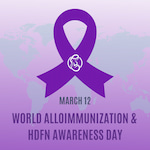Alloimmunization and HDFN Awareness Day Date in the current year: March 12, 2026
 Alloimmunization and HDFN Awareness Day, also known as World Alloimmunization and HDFN Awareness Day, is observed annually on March 12 to raise awareness of a pregnancy complication in which maternal antibodies attack the red blood cells of an unborn baby.
Alloimmunization and HDFN Awareness Day, also known as World Alloimmunization and HDFN Awareness Day, is observed annually on March 12 to raise awareness of a pregnancy complication in which maternal antibodies attack the red blood cells of an unborn baby.Alloimmunization is an immune response that occurs when a person’s immune system produces antibodies against antigens from another individual of the same species. This usually occurs after exposure to foreign red blood cells, platelets, or other tissues through a blood transfusion, organ transplant, or pregnancy.
Maternal alloimmunization occurs when the mother’s body produces antibodies against antigens on the red blood cells of the fetus, which can happen if the fetus has a different blood type than the mother. When they cross the placenta, they attack and destroy the red blood cells of the fetus, causing hemolytic disease of the fetus and newborn (HDFN). Exposure to antibodies can also occur during childbirth.
Maternal alloimmunization and HDFN are sometimes confused, but these conditions are two sides of the same coin: alloimmunization is the condition in the mother, while HDFN is the condition in the baby. There are several types of HDFN depending on the type of antigens involved, ranging from mild to severe. The most common is Rh disease, which occurs when the mother is Rh negative and the fetus is Rh positive.
Common signs of HDFN include anemia and elevated bilirubin levels; the latter manifests as neonatal jaundice (yellowish skin and whites of the eyes) within 24 hours of birth. If left untreated, severe HDFN can lead to heart failure, kernicterus (a bilirubin-induced brain dysfunction that can cause severe brain damage or even death), cerebral palsy, and other complications.
Rh disease is the only preventable form of HDFN. If the mother is RhD negative and the fetus is RhD positive, the mother is treated with Rho(D) immunoglobulin to prevent alloimmunization. Other forms of HDFN are not preventable, but there are treatment options to prevent severe complications from anemia.
The only universally accepted in utero treatment option is intrauterine transfusion (IUT) to replace the destroyed red blood cells of the fetus and prevent the development of severe anemia. Postnatal treatment may include blood transfusions and medications for anemia (it should be noted that anemia in children with HDFN is NOT treated with iron) and phototherapy, intravenous immunoglobulin and exchange transfusions for high bilirubin levels.
Alloimmunization and HDFN Awareness Day was created to raise public awareness about maternal alloimmunization and HDFN and to highlight the urgent need for research and support for mothers and babies affected by these conditions. You can raise awareness and show your support by wearing purple (the color of maternal alloimmunization and HDFN awareness) and posting on social media using the hashtag #empoweredinpurple. You can also get involved by donating to an organization that supports patients with maternal alloimmunization and HDFN.
- Category
- International Observances
- Tags
- Alloimmunization and HDFN Awareness Day, international observances, maternal alloimmunization, hemolytic disease of the fetus and newborn